Internal and external forces in sectoral wage formation: evidence from the Netherlands
Internal forces relate to factors within the firm, like the workers' productivity in the firm, and external forces to factors outside the firm like wages paid elsewhere and the unemployment rate. If the labour market is competitive, the wage will depend primarily on the overall state of the labour market. If, however, internal forces are a prime determinant of wages, insider factors must play an important role in wage bargaining.
The empirical specification is taken from a model proposed by Nickell and Wadhwani. The model is estimated by GMM (generalized method of moments) using annual data of 18 sectors. The results imply that sectoral wages are largely determined by external factors, although internal forces are significant as well. Compared to other research the influence of internal forces is smaller than in the US and Japan, but larger than in most other European countries. Furthermore, it is found that wages in the service sectors are more sensitive to external factors, like the macro unemployment rate and replacement ratio, than wages in the industrial sectors. This suggests that insider factors are more relevant in industrial sectors.
